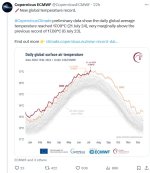You are using an out of date browser. It may not display this or other websites correctly.
You should upgrade or use an alternative browser.
You should upgrade or use an alternative browser.
Random Internet Shit you've come across
- Thread starter WJCO
- Start date
Lunentucker
Hooked
I'd prefer to beat that shit stain to death with wet paper towels. Make it last.
Lunentucker
Hooked
Once again, this guy tears the climate change freaks apart with the "Hottest Day on Record" claims.

 www.facebook.com
www.facebook.com
Alright folks, let's dissect, in detail, this claim that we just observed Earth's “hottest day on record,” and as a few outlets report, the “hottest in >100,000-years.”
Take a walk with me. . .

But don't hold my hand, don't be a weirdo.

So, let's get rollin' like Rosie O'Donnell in the Golden Corral buffet line. But, don't sprain your fat rolls.
Copernicus ECMWF says that the global mean surface temperature (GMST) on Sunday, July 21, was 17.09°C, beating the previous record from July 6, 2023, by just a hundredth of a degree Celsius.
Yes, you read that right, the previous record was beat by 𝒐𝒏𝒆 𝒉𝒖𝒏𝒅𝒓𝒆𝒅𝒕𝒉 𝒐𝒇 𝒂 𝒅𝒆𝒈𝒓𝒆𝒆. Yep, that has caused some scientists to code brown their pants and curl up into a fetal position in fear.

Anyway, this data is derived from their ERA Reanalysis product, which goes back to 1940.
Reanalysis integrates observations and past computer model data from across the world to create a complete global picture of hourly 𝒆𝒔𝒕𝒊𝒎𝒂𝒕𝒆𝒔 of atmospheric, ocean-wave and land-surface variables. Missing data is then interpolated by the model.

 https://cds.climate.copernicus.eu/cdsapp...
https://cds.climate.copernicus.eu/cdsapp...
So, in other words, these aren't measurements. These are computed means from estimated observations and they only go back 84-years, which is 0.000002% of Earth's geological history.
And, this is sufficient enough to compute the GMST to the nearest hundredth of a degree Celsius? That is just laughable.

Don't get me wrong, I love reanalysis, especially ERA5. It's very useful for climate analysis, but like anything, it has its limitations, and this is one of them. Sort-of like Chris Christie doing a marathon.

He has athletic ability limitations. Make sense?
It does? Okay, let's continue. . .
The idea that this was the “hottest in 100,000-years,” as many climate activists suggest, is a very bold claim to make. And, the confidence in that claim goes down like a man being rejected by Kelsea Ballerini when you ask the climate disciple to tell you what the GMST was on this date 7,549-years ago.
 https://washingtonpost.com/.../hottest-day-ever-recorded.../
https://washingtonpost.com/.../hottest-day-ever-recorded.../
During the Early Holocene Thermal Maximum, sea ice cover in the Arctic was often seasonal. Since ice is a good temperature proxy, this in and of itself suggests that the Earth as a whole was warmer at that time than it is today, so the probability that Sunday was the “hottest in over 100,000-years” is exceedingly low. There is a better chance that Joy Reid says something intelligent within the next week.
 https://sciencedirect.com/.../article/pii/S0277379113004162
https://sciencedirect.com/.../article/pii/S0277379113004162
Thanks for coming to my Ted Talk.



Chris Martz
Chris Martz. 31,637 likes · 35,627 talking about this. Meteorologist / science policy analyst at CFACT | Politically incorrect equal opportunity hater | “The Anti-Greta Thunberg” – NY Post | 📧...
 www.facebook.com
www.facebook.com
Alright folks, let's dissect, in detail, this claim that we just observed Earth's “hottest day on record,” and as a few outlets report, the “hottest in >100,000-years.”
Take a walk with me. . .

But don't hold my hand, don't be a weirdo.

So, let's get rollin' like Rosie O'Donnell in the Golden Corral buffet line. But, don't sprain your fat rolls.
Copernicus ECMWF says that the global mean surface temperature (GMST) on Sunday, July 21, was 17.09°C, beating the previous record from July 6, 2023, by just a hundredth of a degree Celsius.
Yes, you read that right, the previous record was beat by 𝒐𝒏𝒆 𝒉𝒖𝒏𝒅𝒓𝒆𝒅𝒕𝒉 𝒐𝒇 𝒂 𝒅𝒆𝒈𝒓𝒆𝒆. Yep, that has caused some scientists to code brown their pants and curl up into a fetal position in fear.

Anyway, this data is derived from their ERA Reanalysis product, which goes back to 1940.
Reanalysis integrates observations and past computer model data from across the world to create a complete global picture of hourly 𝒆𝒔𝒕𝒊𝒎𝒂𝒕𝒆𝒔 of atmospheric, ocean-wave and land-surface variables. Missing data is then interpolated by the model.


So, in other words, these aren't measurements. These are computed means from estimated observations and they only go back 84-years, which is 0.000002% of Earth's geological history.
And, this is sufficient enough to compute the GMST to the nearest hundredth of a degree Celsius? That is just laughable.

Don't get me wrong, I love reanalysis, especially ERA5. It's very useful for climate analysis, but like anything, it has its limitations, and this is one of them. Sort-of like Chris Christie doing a marathon.

He has athletic ability limitations. Make sense?
It does? Okay, let's continue. . .
The idea that this was the “hottest in 100,000-years,” as many climate activists suggest, is a very bold claim to make. And, the confidence in that claim goes down like a man being rejected by Kelsea Ballerini when you ask the climate disciple to tell you what the GMST was on this date 7,549-years ago.

During the Early Holocene Thermal Maximum, sea ice cover in the Arctic was often seasonal. Since ice is a good temperature proxy, this in and of itself suggests that the Earth as a whole was warmer at that time than it is today, so the probability that Sunday was the “hottest in over 100,000-years” is exceedingly low. There is a better chance that Joy Reid says something intelligent within the next week.

Thanks for coming to my Ted Talk.


OverlanderJK
Resident Smartass
Once again, this guy tears the climate change freaks apart with the "Hottest Day on Record" claims.

Chris Martz
Chris Martz. 31,637 likes · 35,627 talking about this. Meteorologist / science policy analyst at CFACT | Politically incorrect equal opportunity hater | “The Anti-Greta Thunberg” – NY Post | 📧...www.facebook.com
Alright folks, let's dissect, in detail, this claim that we just observed Earth's “hottest day on record,” and as a few outlets report, the “hottest in >100,000-years.”
Take a walk with me. . .
But don't hold my hand, don't be a weirdo.
So, let's get rollin' like Rosie O'Donnell in the Golden Corral buffet line. But, don't sprain your fat rolls.
Copernicus ECMWF says that the global mean surface temperature (GMST) on Sunday, July 21, was 17.09°C, beating the previous record from July 6, 2023, by just a hundredth of a degree Celsius.
Yes, you read that right, the previous record was beat by 𝒐𝒏𝒆 𝒉𝒖𝒏𝒅𝒓𝒆𝒅𝒕𝒉 𝒐𝒇 𝒂 𝒅𝒆𝒈𝒓𝒆𝒆. Yep, that has caused some scientists to code brown their pants and curl up into a fetal position in fear.
Anyway, this data is derived from their ERA Reanalysis product, which goes back to 1940.
Reanalysis integrates observations and past computer model data from across the world to create a complete global picture of hourly 𝒆𝒔𝒕𝒊𝒎𝒂𝒕𝒆𝒔 of atmospheric, ocean-wave and land-surface variables. Missing data is then interpolated by the model.
https://cds.climate.copernicus.eu/cdsapp...
So, in other words, these aren't measurements. These are computed means from estimated observations and they only go back 84-years, which is 0.000002% of Earth's geological history.
And, this is sufficient enough to compute the GMST to the nearest hundredth of a degree Celsius? That is just laughable.
Don't get me wrong, I love reanalysis, especially ERA5. It's very useful for climate analysis, but like anything, it has its limitations, and this is one of them. Sort-of like Chris Christie doing a marathon.
He has athletic ability limitations. Make sense?
It does? Okay, let's continue. . .
The idea that this was the “hottest in 100,000-years,” as many climate activists suggest, is a very bold claim to make. And, the confidence in that claim goes down like a man being rejected by Kelsea Ballerini when you ask the climate disciple to tell you what the GMST was on this date 7,549-years ago.
https://washingtonpost.com/.../hottest-day-ever-recorded.../
During the Early Holocene Thermal Maximum, sea ice cover in the Arctic was often seasonal. Since ice is a good temperature proxy, this in and of itself suggests that the Earth as a whole was warmer at that time than it is today, so the probability that Sunday was the “hottest in over 100,000-years” is exceedingly low. There is a better chance that Joy Reid says something intelligent within the next week.
https://sciencedirect.com/.../article/pii/S0277379113004162
Thanks for coming to my Ted Talk.
View attachment 410876
View attachment 410877

Nobody cares
Lunentucker
Hooked
Climate change and Trump did that.
Lunentucker
Hooked
Aceisback
Hooked
Stolen.
Hopefully my old ass can remember where from so I don’t repost it here.
Don’t want to get the gatekeeper’s panties in a bunch.
Lunentucker
Hooked
Lunentucker
Hooked
Wayalife Admin / My Dank Memes Posted Individually for Max Effect


kevman65
Hooked
Before you guys blame her, Kamala was in Indianapolis, so it wasn't her.

 autos.yahoo.com
autos.yahoo.com

Oscar Meyer Wienermobile Rolls Over On Freeway, Police Grill Drivers Involved
We hate to be the ones to break it to you, but America’s only national treasure, the Oscar Mayer Wienermobile, was involved in a roll over accident (note that is roll over and not roller like where you usually find wieners at 7-Eleven.) The deliciously shaped vehicle struck a car before rolling...
NPC 6060⁸42
Hooked
OverlanderJK
Resident Smartass
kevman65
Hooked
Rednecks and Old Farts......
kevman65
Hooked
Yup, and right after the election he'll roll out the red (with brown stains) carpet for them again.










